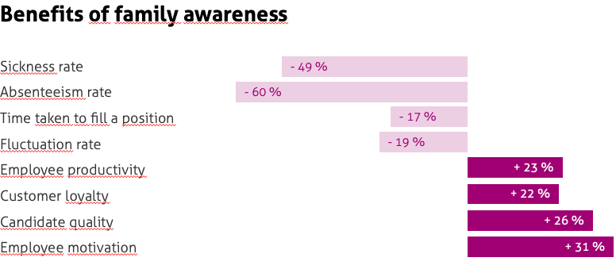Why a family-conscious corporate culture is crucial today
More and more employees no longer want to put their family on the back burner. Whether it be young parents, caring relatives or employees in the so-called sandwich generation: care work no longer only affects the private sphere, but has become a task for society and businesses as a whole.
Demographic change is transforming the world of work
A look at the demographic development shows: The need for care work is increasing - while at the same time, the shortage of skilled labour is growing. Those who think about the future already today will recognise that family awareness is not just a "nice-to-have", but a competitive factor. Companies that take care responsibility into account secure a decisive advantage in the battle for talent and their long-term loyalty.
Life-phase orientation instead of standard processes
Employees have different needs - depending on their stage of life. A new father like Anton needs flexible onboarding. Markus from the sandwich generation needs understanding and support in order to remain productive despite multiple responsibilities. Petra, who is caring for her partner and is about to retire, deserves a dignified transition into retirement.
An HR strategy that takes life phases into account is not just an optional extra - it is a sustainable investment.
The HR cycle rethought: family-friendly through all phases
From recruitment to offboarding to former employees: Those who integrate care needs throughout the entire employee lifecycle promote a healthy, motivated workforce. Studies show: Family-conscious companies record, among other things:

Family friendliness pays off - also financially
Research also shows that investing in a family-conscious HR policy pays off: as early as 2010, the Research Centre for Family-Conscious HR Policy was able to prove that highly family-conscious companies perform significantly better in 19 out of 23 key business indicators than companies with a low level of family awareness (Gerlach, 2010).
The economic impact is measurable: according to an analysis done by Prognos (2003), the return on investment (ROI) of family-friendly measures is 25%. In other words: every investment in compatibility pays off not only in human terms, but also in economic terms.
Our answer: profawo cares
We offer a wide range of services - direct, informative and close to everyday life. This includes workshops, daycare centres, flexible holiday programmes, individual support for family care and much more.
Who cares? - profawo cares.
Visit us at www.profawo.ch or contact us directly:
Literature:
Beste-Fopma, N. (2025). Competitive Advantage Family Awareness: Strategies, Concrete Measures and Best Practices for Attractive Employers. Springer Gabler. https://doi.org/10.1007/978-3-662-69695-8